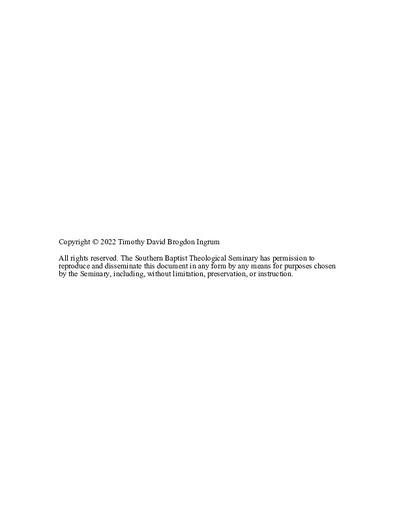The Minds of Men Under Vicious Habits: Intellectual Vice and Testimony Rejection in the Gospel of John
| dc.contributor.advisor | Pennington, Jonathan T. | |
| dc.contributor.author | Ingrum, Timothy | |
| dc.date.accessioned | 2022-05-31T19:50:50Z | |
| dc.date.available | 2022-05-31T19:50:50Z | |
| dc.date.issued | 2022-05-05 | |
| dc.identifier.uri | https://hdl.handle.net/10392/6756 | |
| dc.description.abstract | Trustworthy witnesses testify about Jesus’s identity in John’s Gospel. Some hearers respond in belief, but others respond in unbelief because they are in ethical and epistemic darkness. Intellectual vice, part of what constitutes this darkness, prevents the proper working of faculties, such as hearing testimony with an appropriate degree of trust. I examine cases in the Fourth Gospel in which testimony about Jesus fails to result in belief, determining which intellectual vices the characters exhibit and how these vices stand in the way of belief. Vices that appear include affective polarization, bias, closedmindedness, conformity, dogmatism, emulousness, epistemic insouciance, fear of man, intellectual arrogance and haughtiness, lovelessness toward God, poorly-tuned trust, prejudice, testimonial injustice, and wishful thinking. I argue that this approach ofstudying intellectual vice coheres with John’s purpose in writing and the intended function of literary characters in the Gospel account. | en_US |
| dc.subject.lcsh | Bible. John--Criticism, interpretation, etc. | en_US |
| dc.subject.lcsh | Vice--Religious aspects--Christianity | en_US |
| dc.subject.lcsh | Virtue--Religious aspects--Christianity | en_US |
| dc.subject.lcsh | Faith | en_US |
| dc.title | The Minds of Men Under Vicious Habits: Intellectual Vice and Testimony Rejection in the Gospel of John | en_US |
| dc.type | Electronic thesis | en_US |
| dc.type | Text | |
| dc.type.qualificationname | Th.M. | en_US |
| dc.publisher.institution | Southern Baptist Theological Seminary | en_US |
| dc.publisher.department | School of Theology |
Files in this item
This item appears in the following Collection(s)
-
Open Access Dissertations and Theses
A Collection of dissertations and theses produced by students of the Southern Baptist Theological Seminary

